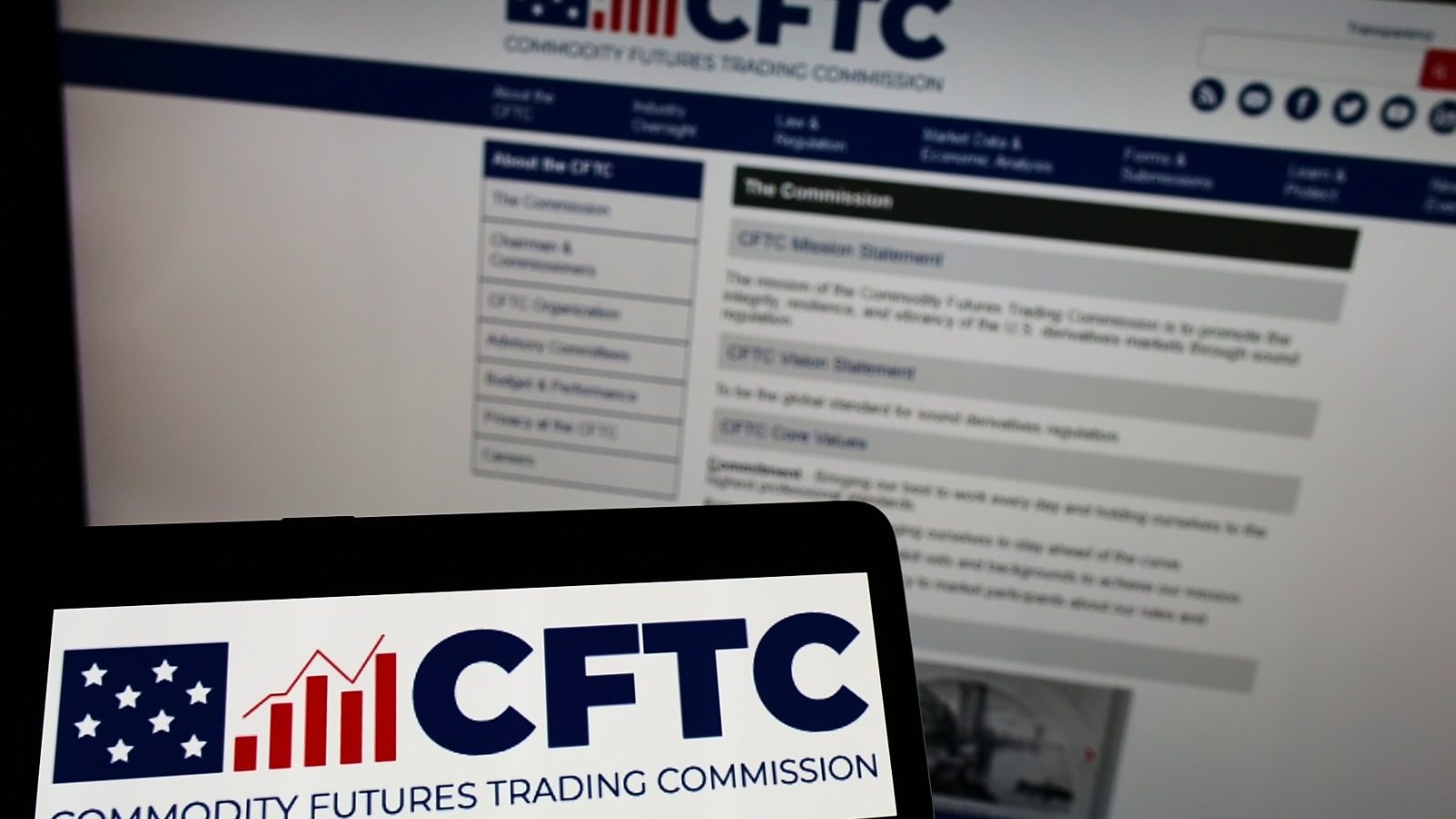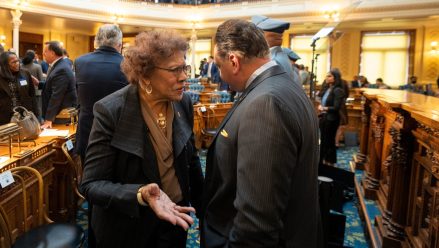Eight tribal entities Thursday had a chance to shoot their shot with regard to sports event contracts to the Commodity Futures Trading Commission (CFTC), but two sources told InGame the takeaway was underwhelming. They say they won’t get any help defending tribal sovereignty or gaming exclusivity from the federal agency.
“What I took from that whole session is that [Acting CFTC Chair Caroline Pham] ain’t doing anything, and doesn’t know if the incoming director is going to do anything,” said one source, who wished to remain anonymous. “It was interesting to hear how in tune she was about not doing anything. It was basically like she was showing us all the ways they can’t do anything.”
A second unnamed source said: “I walked away from that conversation more informed than walking in. She actually did try to answer some of our questions, but for the most part, it was extremely frustrating. She basically said at the outset, ‘I’m happy to talk to you, but I am out the door and I have no idea what the new director might do with this issue.”
At issue is the rise of prediction market platforms, Kalshi in particular, offering sports-related event contracts outside of state legal sports betting laws and in conflict with the Indian Gaming Regulatory Act (IGRA), which ensures exclusivity for Class III gaming to federally recognized tribes. Kalshi and its ilk have maintained in various court proceedings spanning several states that their markets are federally regulated derivatives and effectively not subject to any state rules, or limited by any state-tribal compacts. Two federal judges so far have agreed, preliminarily, and granted injunctions to Kalshi while the legal matters continue.
Pham will be leaving the CFTC whenever a new chair is confirmed by the Senate. President Donald Trump’s nominee, Brian Quintenz, is awaiting the scheduling of Senate confirmation hearings. The commission has five slots, but according to the Compliance + More substack, Commissioner Kristin Johnson (Democrat) will depart in July. Summer Mersinger (Republican) and Christy Goldsmith Romero (Democrat) are out the door this week. That means that by early July, three out of five commission seats will be open, and Pham is already a lame duck.
The CFTC initially planned a roundtable discussion about sports event contracts for April 30, but it was canceled last minute. Earlier this month, some tribal parties received invites to a closed-door conference call. That happened Thursday.
During the 45-minute call, representatives from the California Nations Indian Gaming Association (CNIGA), Elk Valley Rancheria (California), Indian Gaming Association (IGA), Kalispell Tribe of Indians (Washington state), San Manuel Band of Mission Indians (California), Santa Ynez Band of Chumath Indians (California), Tribal Alliance of Sovereign Indians (TASIN/California), and Vetnos, a gaming provider that partners with California’s Chicken Ranch Tribe of Me-Wuk Indians, were offered the opportunity to speak.
IGRA, tribal and state sovereignty ‘devalued’
Those invited were limited to groups that had submitted public comment ahead of the canceled April 30 roundtable discussion. Each was offered five minutes to speak and allowed to have three other representatives on a listen-only line. The all-star lineup included speakers from some of the most powerful tribes and tribal associations in the U.S.
Both sources said tribal representatives made strong cases for the violation of tribal sovereignty, the potential for massive job losses at brick-and-mortar casinos, and more.
Allowing sports event contracts “upends and devalues IGRA, tribal sovereignty, and state’s 10th Amendment rights,” the anonymous source said. “It flies in the face of it. IGRA was designed to make tribes self-sufficient, so this kills that.”
Despite the firepower, the CFTC offered little guidance, other than seemingly sending Indian Country on a path to litigation to halt prediction markets.
Prediction markets “have a free ticket to ride if they call it a prediction contract,” the unnamed source said. “That part of it was embarrassing. So, our expectations were very low going in, we thought this was ‘check the box,’ so I do give her credit that she attempted to answer questions, but it’s clear the CFTC is not going to do a darn thing to stop this, and we’re going to have to look at other courses of action.”
Both sources said that Pham told participants that in its 50 years of existence, the CFTC has never denied or taken action against a contract. Companies licensed by the CFTC as Designated Contract Markets (DCMs) are able to self-certify their offerings, and if the CFTC does not object, the markets are presumed valid.
Potential courses of action
If the CFTC won’t act, Indian Country — and states, for that matter — will have to pursue other avenues for resolution. Kalshi is already in court in three states — Maryland, Nevada, and New Jersey. The company sued the states after each sent out cease-and-desist orders, saying Kalshi is essentially offering illegal sports betting in their highly regulated jurisdictions.
Federal courts in Nevada and New Jersey have found in Kalshi’s favor in the “first round” of the legal fight, granting Kalshi’s requests for preliminary injunctions against the states. The court docket for the Maryland case does not show any decision yet. The state of Arizona May 21 became the seventh to send a cease-and-desist order to the company. Stakeholders are waiting to see if Kalshi will file suit in any of the other states that have sent letters.
Given the tepid response from the CFTC, Indian Country must now begin to explore other ways to prevent Kalshi and similar platforms from encroaching on their exclusivity and challenging sovereignty. That could mean amicus briefs or requests to intervene in existing cases, sending their own cease-and-desist letters, or taking the issue to Congress, which in 1988 initially gave tribes gaming exclusivity. Should legal challenges reach critical mass, there is a possibility that the case will reach the Supreme Court.
Will states and tribes collaborate?
The fight against prediction markets will surely make “strange bedfellows,” as states clearly believe that Kalshi’s offerings violate their sovereign rights, as well. In 2018, after the Professional and Amateur Sports Protection Act was overturned, legal sports betting became a states’ rights issue.
States say the rise of prediction markets — which they have argued lack consumer protections and don’t pay state taxes — is in conflict with their rights. Not all tribes have good relationships with their states, but states and Indian Country could end up working together in efforts to preserve sovereignty. It’s even possible that despite the backlash against the federal SAFE Bet Act, which was met with harsh industry criticism when it was announced in October 2024, gaming stakeholders may collaborate with sponsors Rep. Paul Tonko and Sen. Richard Blumenthal for a legislative fix.
Within Indian Country, a key concern is that sports event contracts could just be the beginning. So far, only seven U.S. states have legal iGaming, but it is understood within the industry that legal sports betting is the gateway to legal online casino. According to InGame data, in states with legal iGaming, that vertical generated an average of 4.15 times as much tax revenue in 2024, and 5.56 times as much in 2025 through April.
The state with the most stark difference is Michigan, where in 2024, iGaming tax revenue was $451.4 million vs. $15.2 million for sports betting. That is nearly 30 times as much.
Future of iGaming at risk
In the coming years, it is likely that more states will add online casino their menu of offerings. Lawmakers in Maryland seriously considered it earlier this year, and the Ohio legislature is now considering a bill. Whether or not prediction markets are found to be legal could have a major bearing on what legal iGaming looks like. One source pointed out that if the CFTC isn’t saying no to new markets, what will prevent prediction markets from offering contracts that mimic online slots or offer targeted contracts on what the next spin of a roulette wheel or card from a blackjack dealer might be?
There are of course many other possible contracts that could overlap with legal gaming that no one has thought of yet. With the CFTC currently allowing sports event contracts, which fall under a prohibited market in the Commodity Exchange Act, what comes next is anyone’s guess.
“Tribal leaders did a good job laying out the gravity of the issues and thought the CFTC would be a safeguard against this,” the unnamed source said. “But what they got back was, ‘No, this was not our mission.'”






